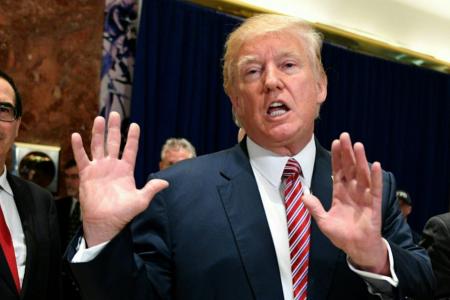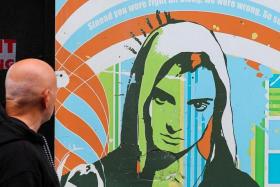Trump again refuses to blame hate groups
US President's latest comments on Charlottesville violence fuel widespread anger
NEW YORK President Donald Trump reignited a political firestorm over US race relations and his own leadership of a national crisis by reiterating on Tuesday that left and right-wing extremists were to blame for the violence at a weekend rally by white nationalists in Virginia.
Many observers saw his comments as a defence of the alt-right factions which form part of his support base.
Not surprisingly, Mr Trump, who was criticised by Republicans and Democrats alike for his initial response, came under fire again for his backflip a day after bowing to pressure to explicitly condemn the Ku Klux Klan, neo-Nazi and white supremacist groups.
Appearing angry and irritated at a press conference, which was called to discuss infrastructure, he maintained that blame belonged on both sides, Reuters reported.
"You had a group on one side that was bad, and you had a group on the other side that was also very violent. And nobody wants to say that, but I'll say it right now," Mr Trump said, referring to right and left-wing protesters.
From there, the back and forth with reporters turned tense. Some of those present later said they could hardly believe what they were hearing.
At one point, Mr Trump said: "You had many people in that group other than neo-Nazis and white nationalists, and the press has treated them absolutely unfairly."
By saying he is not taking sides, Donald Trump clearly is.Democratic Senate leader Chuck Schumer
In what became at times a heated exchange with reporters shouting questions, he also said: "You also had people that were very fine people on both sides."
He also defended his initial statement as adequate, saying that his remarks then were not stronger because he did not "know the facts".
The violence on Saturday erupted after white nationalists converged in Charlottesville in protest of plans to remove a statue of Robert E. Lee, commander of the pro-slavery Confederate army during the US Civil War.
Many of them were seen carrying firearms, sticks and shields. Some also wore helmets. Counter-protesters likewise came equipped with sticks, helmets and shields.
The two sides clashed in scattered street brawls before a car ploughed into the rally opponents, killing one woman and injuring 19 others. A 20-year-old Ohio man, James Fields, said to have harboured Nazi sympathies, has been charged with murder.
Two state police officers were also killed when their helicopter crashed.
On Saturday, Mr Trump denounced hatred and violence "on many sides".
Yielding two days later to a mounting political furore over his initial response, he delivered a follow-up message expressly referring to the "KKK, neo-Nazis and white supremacists and other hate groups" as "repugnant to everything we hold dear as Americans".
Mr Trump's detractors dismissed his revised statements as too little, too late.
His remarks on Tuesday inflamed the controversy further. Referring to the potential removal of General Lee's statue, he asked rhetorically whether Presidents George Washington and Thomas Jefferson owned slaves, and said: "Are we going to take down Thomas Jefferson's statue?"
Former Ku Klux Klan leader David Duke praised his comments as a condemnation of "leftist terrorists".
Democrats seized on Mr Trump's latest words as evidence that he saw white nationalists and those protesting against them as morally equivalent.
"By saying he is not taking sides, Donald Trump clearly is," said Democratic Senate leader Chuck Schumer.
"When David Duke and white supremacists cheer your remarks, you're doing it very, very wrong."
A tweet by former President Barack Obama soon after the violence had garnered 2.8 million "likes" to become the most liked Twitter message ever by Tuesday, the social media network said.
"No one is born hating another person because of the colour of his skin or his background or his religion...," Mr Obama said, quoting the late South African president Nelson Mandela in the tweet, with a picture of himself looking through an open window at a group of children.
Mr Richard Trumka, president of the AFL-CIO labour federation representing 12.5 million workers, became the latest member of Mr Trump's advisory American Manufacturing Council to resign in protest.
"We cannot sit on a council for a president who tolerates bigotry and domestic terrorism," he said. "President Trump's remarks today repudiate his forced remarks yesterday about the KKK and neo-Nazis."
Three other members of the council - the chief executives of pharmaceutical maker Merck & Co, sportswear company Under Armour and computer chipmaker Intel Corp - resigned on Monday.
Get The New Paper on your phone with the free TNP app. Download from the Apple App Store or Google Play Store now



